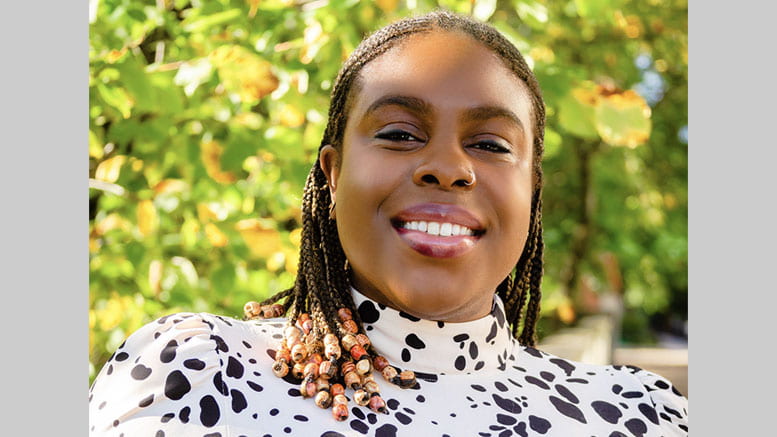Alumni Spotlight Q&A: Meet Marissa Jackson Sow ’06
April 25, 2022

Marissa Jackson Sow graduated from Weinberg in 2006, studying psychology and African American studies. Jackson Sow has previously served as the Deputy Commissioner on the NYC Commission of Human Rights, and General Counsel for the NYC Mayor’s Office for International Affairs. Now a professor of law and published author, Jackson Sow attributes much of her personal and professional growth to her time in the Department of African American Studies.
What inspired you to pursue a major or minor in the Department of African American Studies (AFAM)?
I came to Northwestern feeling very pressured to pursue a pre-med path, and at the time I was flaming out of my biology and chemistry studies, the one class that was bringing me joy was an Intro to African-American Literature class in which I was enrolled. After a period of soul-searching and crisis, I decided to follow my dreams of pursuing a career in human rights law instead, and chose African American Studies (along with another major in Psychology) as my route to that career path.
How did your studies in the AFAM department impact you personally or professionally?
My studies in the AFAM department changed my life. They facilitated my personal, professional, intellectual, and political coming-of-age. I came to college at 16 years old, raised in a very conservative family, and I felt internal conflict all the time because I considered myself to be a feminist concerned with racial justice and human rights issues—matters with which I grew up believing that Christians should not be concerned. My studies of African-American history, literature, and thought revealed to me that the history of the African Diaspora was complex, rich, and long, and that I had the opportunity to become a leader in my communities by investing in that tradition of creating knowledge that centered Black life and culture, and in building politics that elevated Black experiences.
Is there a specific course, event, or memory associated with the AFAM department that sticks out to you from your time at Northwestern?
Every course that I took in the department was a treat. However, the courses that have stuck to my bones and nourished my soul the most in the many years since graduation are the classes on Black Politics and Culture that I took with Richard Iton and the classes on Post-Colonial Theory that I took with Barnor Hesse. Those classes have shaped my intellectual, political, cultural, and scholarly orientation in a foundational way.
What are you working on right now that excites you the most or are there any accomplishments you would like to share?
I have recently become a law professor and will be joining the University of Richmond School of Law. I teach a mix of commercial law, constitutional law, and legal theory courses, and I will be teaching a Race and the Constitution seminar next year. This means so much to me because I took my very first Race and the Constitution class during my senior year at Northwestern, with Richard Iton—a class that prepared me well for my constitutional law studies in law school. I am also really proud of my scholarly accomplishments. Even though I have only been in the academy for a year so far, my work on white supremacy in the law has been published, or is forthcoming, in a number of top journals and I am now being approached by academic presses to write books. I attribute my ability to write so prolifically to the academic training I received in the African-American Studies Department.
What’s a fun fact that you want to share with the Northwestern community?
I am still rowdy and very opinionated, but I am no match for my children! And I’m an avid member of the Peloton community.
How do you enjoy spending your free time?
I love to travel with my family and friends! My husband is from Senegal, and we spend as much time there as we can, and we are on a mission to see as many other countries as we can!
Alumni & Students

Passion for the planet: A new generation of environmental stewards starts here
May 29, 2025
Over the last two decades, the Weinberg College-housed Program in Environmental Policy and Culture (EPC) at Northwestern has embraced the humanities and social sciences and cultivated a new generation of environmental stewards. Growing up in…

Senior art exhibition spotlights new techniques, artistic growth and community
May 23, 2025
Peristeronic, meaning “of or relating to pigeons,” may have fallen out of common use, but to the 10 artists in the exhibition opening May 22 at Dittmar Gallery, the term suggests a reverent irreverence. Lucie…

Northwestern receives gift to enhance Jewish studies and student experience
May 20, 2025
Northwestern University has received a generous gift from an anonymous donor to support the Jewish studies program and enhance activities for Jewish student life. The gift will enable the University to increase its undergraduate course…

The real beneficiaries of protective labor laws for women
May 20, 2025
During the first half of the 20th century, many states passed labor laws in response to the influx of women into the modern workplace. The so-called protective labor laws enacted by U.S. states restricted women’s…



